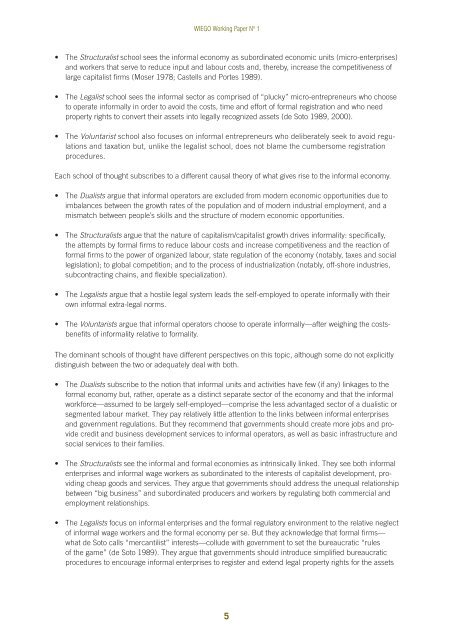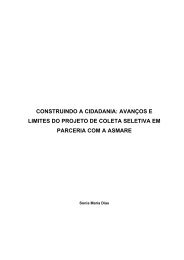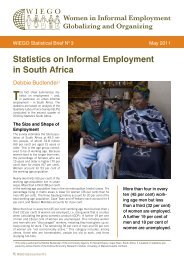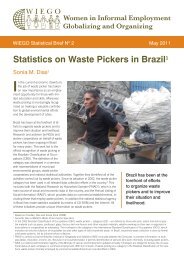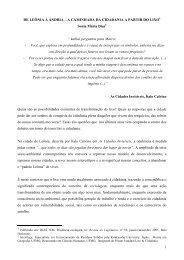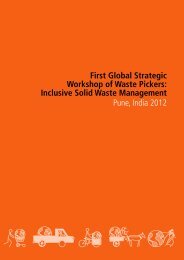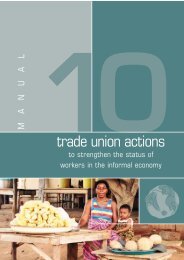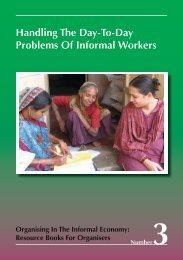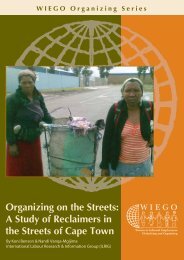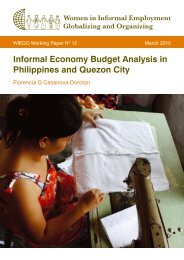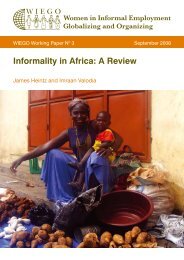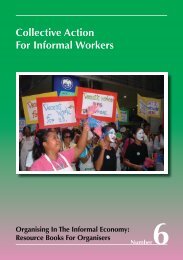The Informal Economy: Definitions, Theories and ... - Inclusive Cities
The Informal Economy: Definitions, Theories and ... - Inclusive Cities
The Informal Economy: Definitions, Theories and ... - Inclusive Cities
Create successful ePaper yourself
Turn your PDF publications into a flip-book with our unique Google optimized e-Paper software.
WIEGO Working Paper N o 1<br />
• <strong>The</strong> Structuralist school sees the informal economy as subordinated economic units (micro-enterprises)<br />
<strong>and</strong> workers that serve to reduce input <strong>and</strong> labour costs <strong>and</strong>, thereby, increase the competitiveness of<br />
large capitalist firms (Moser 1978; Castells <strong>and</strong> Portes 1989).<br />
• <strong>The</strong> Legalist school sees the informal sector as comprised of “plucky” micro-entrepreneurs who choose<br />
to operate informally in order to avoid the costs, time <strong>and</strong> effort of formal registration <strong>and</strong> who need<br />
property rights to convert their assets into legally recognized assets (de Soto 1989, 2000).<br />
• <strong>The</strong> Voluntarist school also focuses on informal entrepreneurs who deliberately seek to avoid regulations<br />
<strong>and</strong> taxation but, unlike the legalist school, does not blame the cumbersome registration<br />
procedures.<br />
Each school of thought subscribes to a different causal theory of what gives rise to the informal economy.<br />
• <strong>The</strong> Dualists argue that informal operators are excluded from modern economic opportunities due to<br />
imbalances between the growth rates of the population <strong>and</strong> of modern industrial employment, <strong>and</strong> a<br />
mismatch between people’s skills <strong>and</strong> the structure of modern economic opportunities.<br />
• <strong>The</strong> Structuralists argue that the nature of capitalism/capitalist growth drives informality: specifically,<br />
the attempts by formal firms to reduce labour costs <strong>and</strong> increase competitiveness <strong>and</strong> the reaction of<br />
formal firms to the power of organized labour, state regulation of the economy (notably, taxes <strong>and</strong> social<br />
legislation); to global competition; <strong>and</strong> to the process of industrialization (notably, off-shore industries,<br />
subcontracting chains, <strong>and</strong> flexible specialization).<br />
• <strong>The</strong> Legalists argue that a hostile legal system leads the self-employed to operate informally with their<br />
own informal extra-legal norms.<br />
• <strong>The</strong> Voluntarists argue that informal operators choose to operate informally—after weighing the costsbenefits<br />
of informality relative to formality.<br />
<strong>The</strong> dominant schools of thought have different perspectives on this topic, although some do not explicitly<br />
distinguish between the two or adequately deal with both.<br />
• <strong>The</strong> Dualists subscribe to the notion that informal units <strong>and</strong> activities have few (if any) linkages to the<br />
formal economy but, rather, operate as a distinct separate sector of the economy <strong>and</strong> that the informal<br />
workforce—assumed to be largely self-employed—comprise the less advantaged sector of a dualistic or<br />
segmented labour market. <strong>The</strong>y pay relatively little attention to the links between informal enterprises<br />
<strong>and</strong> government regulations. But they recommend that governments should create more jobs <strong>and</strong> provide<br />
credit <strong>and</strong> business development services to informal operators, as well as basic infrastructure <strong>and</strong><br />
social services to their families.<br />
• <strong>The</strong> Structuralists see the informal <strong>and</strong> formal economies as intrinsically linked. <strong>The</strong>y see both informal<br />
enterprises <strong>and</strong> informal wage workers as subordinated to the interests of capitalist development, providing<br />
cheap goods <strong>and</strong> services. <strong>The</strong>y argue that governments should address the unequal relationship<br />
between “big business” <strong>and</strong> subordinated producers <strong>and</strong> workers by regulating both commercial <strong>and</strong><br />
employment relationships.<br />
• <strong>The</strong> Legalists focus on informal enterprises <strong>and</strong> the formal regulatory environment to the relative neglect<br />
of informal wage workers <strong>and</strong> the formal economy per se. But they acknowledge that formal firms—<br />
what de Soto calls “mercantilist” interests—collude with government to set the bureaucratic “rules<br />
of the game” (de Soto 1989). <strong>The</strong>y argue that governments should introduce simplified bureaucratic<br />
procedures to encourage informal enterprises to register <strong>and</strong> extend legal property rights for the assets<br />
5


